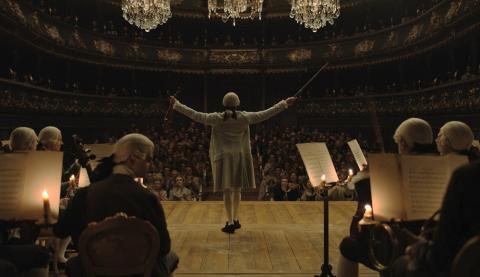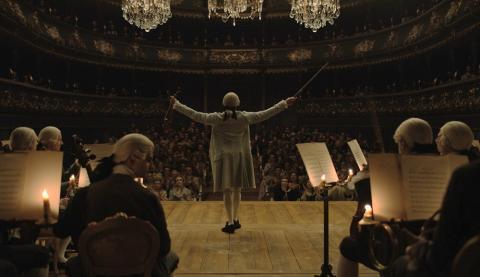
Flannery O’Connor populated her writing with smart, cynical southerners taking devilish pleasure in puncturing post-Confederate false pieties, though they’re often taken off guard by their enduring Christian credulities bred from birth – in other words, people much like O’Connor herself.
Ethan Hawke’s latest directorial outing Wildcat, which taps his daughter Maya to portray the author as she returns to her Georgia home, literalizes this connection with flights of fiction taking us inside her short stories. In text-within-a-text renderings of Good Country People and Everything That Rises Must Converge, Maya plays Flannery playing her stand-ins, and every small-minded housewife becomes her maddening mother (Laura Linney). Though Ethan’s fandom for a literary genius comes across loud and clear, he’s ultimately doing a disservice to her prose by reinforcing a reductive misconception about scribes: that inspiration, the ineffable alchemy he wants to pin down with his inquest into the crannies of the mind, boils down to plucking the right elements from your immediate surroundings and simply plugging them into narrative. “The life you save may be your own,” mumbles Flannery as she passes a roadside sign painted with the phrase that would title one of her later compositions. Simple as that.
That’s the Dewey Cox-est moment in a biopic with a fumblingly obvious notion of creativity, declared in bold type up top with an opening O’Connor quote about fiction as a plunge into reality rather than an escape from it. Not that anyone would blame her for wanting to get away; the lupus that soon hinders the use of her legs and necessitates forearm crutches has also driven her back to the town she couldn’t wait to leave. She scowls through the cheerful racism and badgering propriety of her mother, who doesn’t understand why her daughter can’t just write something comforting and nice for a change. But she has no interest in sanitizing society, which we know because she comes right out and says so to a workshop douche giving her the unsolicited advice that she’ll sell more copies if she softens the N-word to “negro”. Ethan has clearly given thought to what makes O’Connor a distinct personality, and strikes the right contrast between her jaded disaffection and her prevailing beliefs, but always by artlessly speaking them in plain declarations.
Maybe the lack of subtlety comes down to genetics, as Maya doesn’t fare much better in her simplifying efforts to isolate the essence of a woman reluctant to let anyone in. Dowdied up with unkempt hair, bookworm spectacles, dingy dentures and a rash that covers her cheeks as if in homeliness drag – its falseness thrown into sharper relief by Flannery’s more telegenic appearance in the interludes visualizing her words – she makes a thinking-face like someone trying to win at charades. Her peach-cobbler accent comes and goes, and it’s a relief when she seems to finally give it up. (And let no one accuse Ethan of playing favorites; his son Levon also appears in a cameo that allows him to show off his six-pack. Thanks, Dad!) Even the reliable Linney has been infected with whatever contagion was going around set turning hands into ham, differentiating the roles within her role by playing each one as a different community theatre caricature. The permissiveness of an actor-director toward his cast, along with a parent’s partiality to their child, can be fatal when combined.
The Good Country People segment taunts audiences with the far more appealing prospect of Ethan Hawke just adapting O’Connor’s corpus directly, rather than using it to plop subtext in our laps. Maya turns in her best acting as Hulga, a one-legged Nietzsche reader who fancies herself savvier than the provincial rubes around her, until she’s startled to find that the apple-cheeked Bible salesman (Cooper Hoffman) she was going to seduce is really a nihilistic, handsy thief. This fragment even looks better than the rest of the film, cinematographer Steve Cosens having finally selected a lens that doesn’t distract as it apes mid-century still photography.
Ethan Hawke has good taste, and his past undertakings as director have affirmed that, but the biopic’s big built-in pitfall – the psychologically facile connect-the-dots between a figure’s life and works – swallows up his perceptible esteem for O’Connor. The groaner of a final shot ensures that we don’t have to worry about interpreting its symbolism, explained all but explicitly moments earlier. O’Connor attained the greatness that brings about a treatment like this one in part for the skill with which she squirreled away meaning, trusting her readers to excavate it from between the lines of stories freighted with implication. Ethan Hawke, for all his admiration of a deserving intellect, never gives his viewers the chance.
Wildcat is screening at the Toronto film festival with a release date yet to be announced












